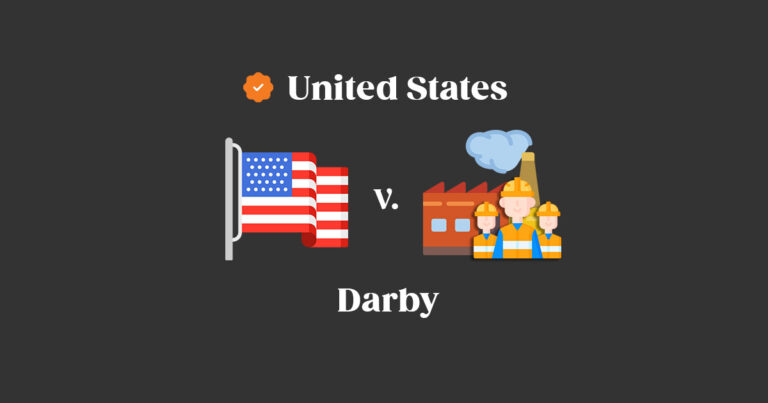Quick Summary
The case United States v. Darby Lumber Co. resolved the constitutionality of the 1938 Fair Labor Standards Act (FLSA), which established minimum wage, overtime pay, equal pay, and prohibited the employment of children under certain ages.
The central issue in the case was whether Congress had the constitutional power, under the Commerce Clause, to regulate the production of goods within a state.
Darby Lumber Co. argued that the FLSA was unconstitutional because Congress lacked the constitutional authority to regulate the production of goods within a state. The District Court for the Southern District of Georgia ruled that the federal government was prohibited by the Tenth Amendment from establishing a minimum wage and maximum hours standard in each state.
The FLSA was ultimately affirmed by the Supreme Court, which decided that Congress had the right to regulate state-level manufacturing laws if they had a major impact on interstate commerce. The Court determined that the FLSA did not violate the Tenth Amendment and that it was a legitimate use of Congress’ authority under the Commerce Clause.
Rule of Law
Congress has the power to regulate activity within a state if it has the potential to impact inter-state commerce, regardless of the intended purpose of the regulation.
Facts of the Case
In 1938, Congress passed the Fair Labor Standards Act, establishing maximum working hours and a minimum wage. Darby Lumber Co., located in Georgia, was charged with violating the Fair Labor Standards Act conditions after the company expanded and then began to lose profitability. Some Darby Lumber Co. employees worked more than 44 hours per week without overtime compensation, and some employees’ wages did not meet the minimum wage required by the Act.
Darby Lumber Co. argued that the Fair Labor Standards Act was unconstitutional because Congress did not have the constitutional authority to regulate the production of goods within a state.
The court of the Southern District of Georgia ruled that the Tenth Amendment prohibited the federal government from establishing a standard for minimum wage and maximum hours across all states. The government then appealed the decision to the Supreme Court.
Issue
Is the impact of local employees’ wages and working hours on interstate commerce significant enough for Congress to have the constitutional authority to regulate them?
Holding and Conclusion
Yes.
The Supreme Court overturned the District Court decision, saying that the Fair Labor Standards Act was legal because the Commerce Clause gave the Government the power to regulate employment standards in producing goods that affect interstate commerce.
The Court said that the Commerce Clause gave the Government the power to stop states from using bad labor practices to get an advantage in interstate commerce. Even though goods made in the same state where they were sold did not count as interstate commerce, moving those goods across state lines did. And since Darby’s lumber was sold all over the U.S., the Fair Labor Standards Act applied to the things he made.
The Court decided that Congress could control working conditions in the states as long as the employer did business across state lines.
Reasoning and Analysis
The Court unanimously overturned the decision of the appeals court. Instead, it upheld Congress’s constitutional power to regulate interstate commerce, which “cannot be increased or decreased by the exercise or non-exercise of state power.” The Court said the Act’s purpose was to stop states from using bad labor practices to make money through interstate commerce.
The Supreme Court said that Congress could require companies to follow the FLSA’s rules for production. The Court also said that the employer could be held accountable for breaking the law, and the employer had to keep track of how well he followed the law.
The courts thought it didn’t matter why Congress wanted to regulate commerce as long as the rules didn’t break any other constitutional rules. In the end, the United States v. Darby decision overturned the decision in Hammer v. Dagenhart, which said that Congress didn’t have the power to control commerce between states. This was a very important time in history for figuring out what Congress could do with the complicated Commerce Clause.
Relevant FAQs of this case
References
Was this case brief helpful?
